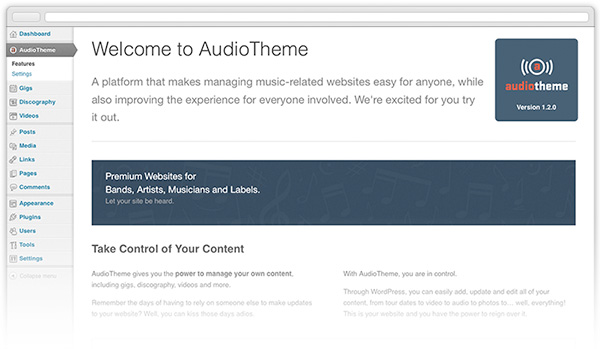Music is made to be heard just like ideas are written to be read.
For far too long, musicians looking to establish an online presence have had a tough row to hoe. Whole companies are based on serving specific subsets of their needs, leaving them to cobble together the fragmented pieces into something that resembles a website — without ever really owning their data.
While WordPress is a powerful publishing platform, it’s not specifically geared towards the needs of artists without a significant amount of work. It’s easy enough for a skilled developer to throw a solution together, but too much time, effort, and money are still required, while constantly reinventing the wheel without providing a stepping stone for continued improvement.
There must be a solution, right?
With that in mind, we built AudioTheme: A platform consisting of a framework plugin and theme marketplace to serve the needs of the music community.
What is This AudioTheme That You Speak Of?
To start, the framework provides functionality for managing gigs and venues, discography (liner notes for the web), and videos, with a familiar template tag API for accessing data and creating themes.
We believe that:
- When a fan fires up Google to search for the lyrics to a song, they should find a corresponding page on the artist’s website that serves as the canonical home for that track.
- A list of shows should be readily available to find out if an artist is playing in a nearby venue.
- Visitors unfamiliar with an artist should be able to visit their website and easily listen to their music to get an an idea of what they sound like.
- Artists should be able to manage their content from a consistent and simple interface.
The AudioTheme framework makes all of that possible.

Why WordPress?
Being inspired by WordPress and its phenomenal community is all well and good, but why use it as a base platform? After all, it’s taken a lot of heat from developers who find it inelegant and designers who consider it too complex.
The truth is WordPress has become somewhat of a standard for self-hosted, easy to manage websites. The barrier to entry at all levels is fairly low; people are familiar and comfortable with the various business models; it has a huge user base and thousands of designers, developers, and teachers that can support it. Why not tap into that audience to enable musicians and professionals alike?
If we’re doing what’s best for our end-users, and budget is a concern, creating a proprietary system or adopting a lesser known toolkit doesn’t serve anyone’s needs.
And by extending WordPress, the functionality that may be too unique or complex to bundle into our core offering can be fulfilled by one of the thousands of plugins available and the thousands yet to be built. It would be foolish to think we could do it all.
Some of the tenets and best practices of the WordPress project and the community at large are ones we found appealing and instrumental in shaping what we want AudioTheme to become:
- Democratize Publishing – We hope to do for music makers what WordPress has done for allowing individuals to communicate their written ideas.
- Data Ownership – Too many times we’ve seen services that shut down with no way to recover your content.
- Content Portability – Musicians tend to redesign with each album release. The solutions currently available require building on their current, esoteric system, or rebuilding from the ground up. By standardizing the approach, a redesign can be as simple as switching themes.
- Community – It’s not just the implementation of music-oriented websites that are continually reinvented, but the knowledge gained and ideas for improving them aren’t being shared and cultivated. As our base grows, we hope to foster a community that will push the boundaries of how fans and musicians interact.
When you consider the ecosystem as a whole, the benefits far outweigh those offered by any other platform available. Maybe the question starting the conversation should be, “Why not WordPress?”
We hope you’ll check out AudioTheme and let us know what you think.


3 Comments